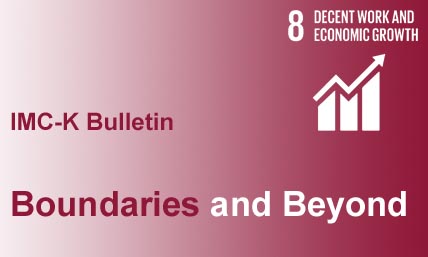
Domain Bulletins
Boundaries and Beyond – Volume 01, Issue 01
Migration, both internal and external, is reinventing itself. The powerful forces of demographic shift coupled with globalisation and technological innovations are accelerating the rate of change in the international and domestic employment market. There is growing evidence that freer mobility of people across borders will be the next frontier of globalisation. The demand for young trained and skilled workforce to fill the large structural shortages of workers and skillsets across the developed world and beyond is set to grow rapidly and India is brilliantly poised to adapt this. Migrants are integral to the growth of any economy and contribute to a significant portion of the country’s gross domestic product. Yet, the irony is that the migrant labourers are often caught in a limbo, literally and figuratively. They are often not accounted for at their places of work and are bereft of any end-user benefit of social welfare measures due to their
perpetual state of flux. Images of millions of workers trudging across miles to reach home have brought to the center stage the cataclysmic magnitude of internal migration and its hardships. It has put back the focus on the “invisible” workforce and onus on us. We have commodified humans who are the backbone of India’s economic engine. The crucial parts, who make the whole and yet they have been pushed to the margins. It is about time we look back at the humanitarian crisis with some humaneness left in all of us.
Karnataka needs to set an example by not just encashing on the emerging opportunities but also bringing back the humane values in the aspects of migration. While migration both within our country and beyond its border is expanding, societies have to realign their moral compass to address the plight of the migrant workers. Now with the International Migration Centre – Karnataka initiative, the Government of Karnataka has taken a bold step for international migrants. The Department of Skill Development, Entrepreneurship and Livelihood (SDEL) has envisioned International Migration Centre-Karnataka (IMC-K) as Karnataka State’s nodal agency to deal with emigrants as a “Go To Centre” for fulfilling the state’s capacity on migration opportunities and to ensure safe, orderly and humane migration process.
Stakeholder Interview
Q. How do you foresee the role of the IMC-K in positioning Karnataka as the prime source region for skilled and certified labour?
A: International Migration has emerged as a major driver of global economic growth. There is a growing recognition that the transnational movement of talent and the mobility of skills across borders is a mutually beneficial process for both the countries of origin and destination alike. For Karnataka, there is an opportunity to leverage its substantial leadership in science and technology to foster an effective and innovative Overseas Employment Pathways (OEP), for its skilled workers of all levels – high, middle and low, to benefit from the employment opportunities abroad. Karnataka aims to carve out a niche as a leading state of origin and source of skills to a diverse destination base. Currently, the State ranks low on the overseas employment map with respect to migration of low and middle-skilled workers who emigrate to the Emigration Check Required (ECR) countries. However, Karnataka has been a prime origin State for migration of professionals abroad across sectors & occupations from the Science, Technology, Engineering and Mathematics (STEM) fields.

Sri. Ashwin D Gowda
Managing Director
Karnataka Skill Development Corporation Government of Karnataka
Advisedly responding to opportunities and challenges of international migration, the IMC-K framework has been developed, as Karnataka State’s nodal agency to deal with emigrants, a one-stop-centre for all matters related to overseas employment of intending international migrants from Karnataka.
The International Migration Centre Karnataka (IMC-K) would provide strategic direction to international migration from Karnataka and more specifically, set the state on a sustainable and institutional Overseas Employment Pathway that can open myriad opportunities for the young, talented, skilled and trained women and men from the state to access better opportunities overseas. IMC-K seeks, through significant enhancement to the state’s competitiveness, skill levels of the workforce and a progressive migration praxis framework to make Karnataka the preferred state of origin for skilled and trained workers. IMC-K will also play the role of the apex institution to make the process of emigration from Karnataka simple, efficient, orderly, socially responsive and humane. It will make use of existing institutions and efforts; guiding and directing every stage of the migration life-cycle.
Q. In your opinion, what makes the IMC-K Framework unique when compared with similar ongoing efforts in other States?
To complement the existing framework of Recruitment Agents serving Karnataka, the IMC-K has helped the Government of Karnataka to establish two government-run RAs – the Karnataka Vocational Training Skill Development Corporation (KVTSDC) and Karnataka State Unorganised Workers Social Security Board (KSUWSSB). The objective of RA-Ks is to be the beacon of ethical recruitment practices in Karnataka. The purpose is to promote the welfare of migrant workers by providing safe and ethical recruitment services to job seekers. In addition, IMC-K has developed a unique bottom-up approach known as the three-tier Migration Facilitation Architecture (MFA) which will enable a smooth transition of migrants from Karnataka to their destination country and will provide them with authentic information, guidance and training. The architecture is envisaged to provide official, credible, complete, accurate and reliable information at the last mile to those most in need of this information. IMC-K through its three-tier architecture aims to provide enhanced protection and handholding throughout the migration life-cycle to promote safe, orderly and legal migration. The three-tier architecture includes- 30 Migrant Information Centres (MIC), 4 Migration Regional Centres (MRC) and 1 Migration State Centre (MSC). The MIC aims to connect citizens at the last mile and bring Karnataka’s working age population into IMC-K fold by disseminating information. Apart from providing accurate and relevant information, the four MRCs will also provide high quality pre-departure orientation training to the potential migrants. MSC will take up the supervisory role and oversee the operations of the entire three-tier architecture. It will also act as a single point for contact for the Ministry of External Affairs, and international stakeholders.
IMC-K will play the role of an apex institution to make the process of emigration from Karnataka simple, efficient, orderly, socially responsive and humane. IMC-K will attempt harmonisation of vocational skills and training offered in Karnataka with international standards through partnerships with multiple stakeholders, offer bridge training to skilled migrants in Karnataka to match international standards through its training partners, serve as a counselling and information centre and assist in reintegration and creating an ecosystem where the skills of returnees can be effectively utilised. In effect, the IMCK will be positioned as an institutional enabler of competitive and innovative economic growth for Karnataka, and not just as an agency for overseas employment.
Q. What according to you is the role of Government Recruitment Agencies during
the COVID-19 crisis?
A: Especially in times of crises such as COVID-19 pandemic, government recruitment agencies have a crucial role to play. This becomes even more important when considering the role of the IMC-K which is to ensure the safe and orderly migration of workers from Karnataka. As a government recruitment agency, the RAs also have a role to serve as model RAs to ensure that ethical practices are being followed and the welfare and rights of the migrants are prioritised. In situations such as the COVID-19 crisis, government RAs are in a unique position to coordinate effectively with both the Government of Karnataka and the governments of the destination countries to ensure that migrants can return safely and without any hassles. The Government of Karnataka has also placed a special focus on the welfare of returnee migrants using the Kaushalkar portal and database. The data on returnee migrants are recorded not only for documentation purposes but also to facilitate the rehabilitation of these migrants by undertaking skill mapping activities based on domestic employment needs. The recruitment agencies are also in the capacity of guiding the migrants on the possible alternative employment opportunities locally.
Project Updates

Migration Familiarisation Programme
Migration Familiarisation Programme is a series of extensive sessions conducted for awareness generation and capacity building among the members of the IMC-K team. The sessions serve as an opportunity to understand the various aspects of international migration including the history of migration, various trends in migration and mandatory recruitment functions that need to be carried out by the recruiting agencies as per The Emigration Act, 1983 (31 of 1983). The detailed sessions help in understanding the various aspects of the Act, including procedures and guidelines for recruitment as well as the penalties and punishments for nonadherence as per the Act. So far, 20 participants including members of the Recruitment Agencies (KVTSDC, KSUWSSB) and IMC-K team have been an active part of the sessions. Six lectures of the Programme have been conducted since June 29, 2020.
The Migration Facilitation Architecture (MFA) follows a Three-tier Architecture constituting 30 Migrant Information Centres (MICs), 4 Migrant Regional Centres (MRCs) and the Migrant State Centre (MSC). It is a crucial component to promote safe, legal, orderly and humane migration from the State of Karnataka. MICs and MRCs are housed in the Employment Exchange offices at the district level and the Staff associated with the YES Kendras are associated with counselling, coordination and registration of potential migrants. The MICs and MRCs will be operationalised in eight districts as a pilot. While Centres at Huballi, Kalburgi, Bengaluru and Mangalore will act as MRC Centres, Ballari, Tumkur, Vijaypura and Udupi will be the MICs.

Familiarisation Programme for the YES Kendra Staff
A familiarisation programme was conducted on June 24, July 1 & 2, 2020 for the YES Kendra staff and Employment Exchange Officers. The orientation session introduced the team to the objective of setting up the International Migration Centre – Karnataka (IMC-K) and the threetier architecture. In the next sessions, an in-depth discussion of the Information, Education and Communication (IEC) materials was followed by a detailed explanation on topics ranging from registration of potential migrants, passport and visa requirements for various categories, safety and welfare measures for migrants and Pre-departure Orientation Training. A follow up session on July 15, 2020, will focus on understanding the Management Information System and IMC-K Portal for the YES Kendra staff.

Team Building Workshop
A team building training was conducted for the IMC-K team to understand the need and importance of working in a team. The training was held on Friday, June 26, 2020 at the IMCK office, for a 5-hour duration. There were 22 participants (5 joined the training online). The training was well received and the participants found it useful.

